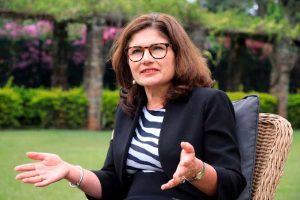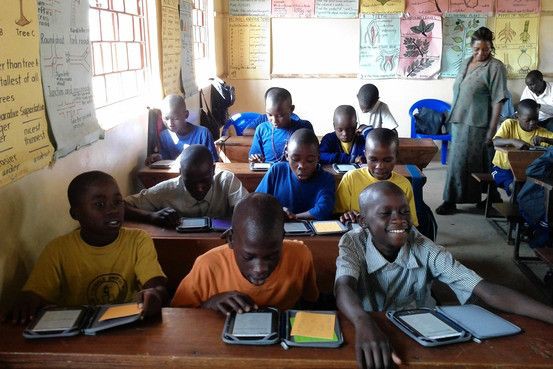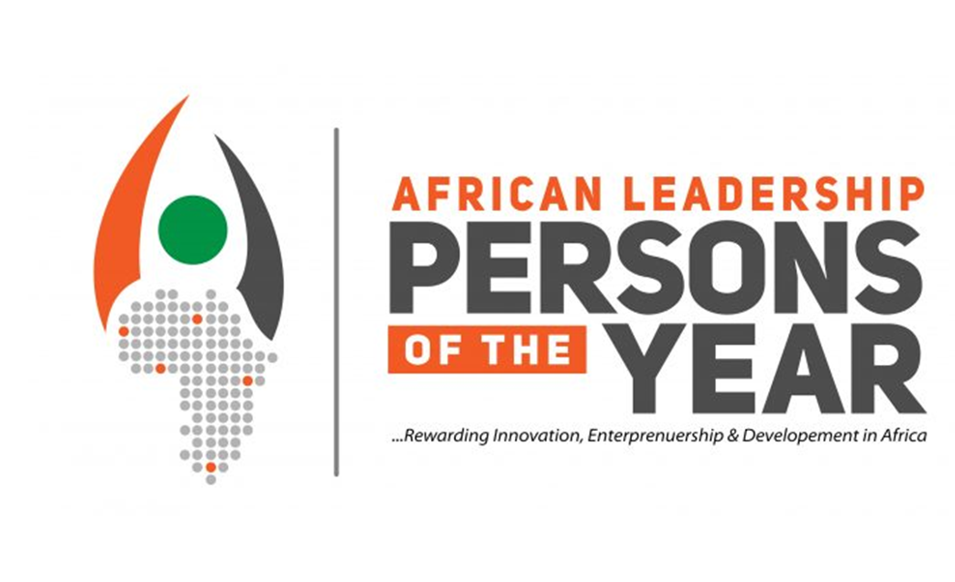Exclusive Interview with Henriette Geiger on Historic Ties Between The EU And Kenya
By Meresia Aloo
Kenya and the European Union have a long history of cooperation. The European Union is now Kenya’s largest export market.
It is also a key partner in regional security, economic investment in Kenya, and development cooperation.
African Leadership Magazine’s East Africa Correspondent, Meresia Aloo, met with the EU ambassador to Kenya, H.E Henriette Geiger, on the sidelines of the EU Kenya Business Forum to discuss the historical ties between Kenya and the EU.
EXCERPTS
ALM: Today there are so many dignitaries in the room: including Olivier Becht, French Minister Delegate for Foreign Trade, Economic Attractiveness, French Nationals Abroad, His Excellency Dr. William Samoei Ruto, President of Kenya, and Thomas Östros, European Investment Bank, Vice-President…. quickly if you don’t mind could you kindly highlight to us what’s happening today.
H.E Henriette Geiger: “We are holding today an EU Kenya Business forum. We have been planning this for a very long time, but due to COVID, we needed to reschedule it until now. So this has become a reality, but our ambition to grow our trade and investment relations with Kenya is longstanding, and we are going from strength to strength. You heard in the conference that we are already Kenya’s most significant business partner, not in terms of the country by country, but, if you use the EU as a block, we are the largest trading partner and number two in investment. Even with this, there is still so much untapped potential, and we need to create jobs, both in the EU and Kenya”.
ALM: Good to know. Today seems to be a great day for the EU, Kenya, the private sector, and the government. I’m sure this is the first time the EU and its Member States have brought European companies to discuss how to increase EU investment in Kenya; What’s your take, please?
H.E Henriette Geiger: “So we are aware that business relations are following a business logic and it is up to business people and contacts and business-to-business agreements to create a thriving and dynamic process, and as you may have heard, the entire conference is about sustainable trade.
The EU is in the process of negotiating an EU-Kenya economic partnership agreement to provide a solid and predictable framework for EU-Kenya business and investment to thrive. We also want to demonstrate that a green transition is feasible, that it can generate jobs and growth, and that there is no conflict between economic growth and development and protecting the environment, and fighting climate change. For this Business Forum, we have invited 250 companies from the European Union and 250 companies from Kenya to explore sustainable growth in different areas and it is our ambition, given that so many more companies signaled interest in participating, we may organize another Business Forum in the future”.
ALM: Fair enough. The European Union is the biggest market in the world for Kenya’s exports. It is also a major source of funding – supporting the transition towards a green economy, regional security, investing in Kenya’s economic sectors of Agriculture, Resilience, Infrastructure Development, Public Financial Management Reforms, and support to alleviating humanitarian crises that affect Kenya…Please take us through some of the other global aims that EU shares with Kenya.
H.E Henriette Geiger: “One of our principal objectives is to support Kenya in its transition to a green and digitalized economy.
I do not know if you were in the room when the Kenyan President spoke, but his vision is similar to that of the European Union regarding the need to make the transition to a green economy. He stated that globally we are at a crossroads and business as usual is no longer an option. We need to build sustainable economies, whilst also reducing inequalities.
Consumers in the European Union are becoming more aware that they have a responsibility in how they consume the products they purchase. As a result, nowadays you can obtain a much higher price for environmentally sustainable or socially sustainable goods, such as products from co-operatives, women-led businesses, and green labels. In that context, we are also collaborating with Kenya on value chains to add value for export. For example, in the coffee chain, it is striking how little profit stays in the country because it all goes into the next stage of the marketing chain so that the high price paid by the end consumer benefits the intermediary trader or the coffee shop owners.
While Kenya has recognized this as an area that requires effort, the corresponding skills will have to be built to create value chain s and this is why we are collaborating with Kenya on technical and vocational education and training (TVET). For example, we support Kenya on the development of digital skills”.
ALM: And how about the ambitious climate, bio-diversity, and environmental global agenda?
H.E Henriette Geiger: “The EU is attempting to shift its entire economy. However, we are also attempting to assist our partners in achieving that goal, which is why we developed the global gateway strategy. The EU is one of the largest providers of development assistance worldwide. Grant money is good, but never sufficient. Realising that, the EU has created the Global Gateway concept, to allow leveraging our grants with sustainable loans, guarantees and technical assistance to support our partner countries in meeting their enormous investment needs, particularly in the post-COVID recovery”.
Considering the challenges we face, particularly in the area of climate change, we must also consider new and innovative avenues for funding. Numerous international discussions are taking place, and the EU, along with all other countries, is a participant in these discussions.
The current global supply chain disruptions also led to a debate about what a country needs to produce minimally to have a certain level of food security or essential supply. It is important that a country is not running out of food within a few days. Through the global gateway, we are assisting partner countries in making the necessary investments to increase their production capacity in their own countries, including pharmaceutical manufacturing”.
ALM: Terrorist atrocities have occurred in Kenya and Europe. Furthermore, the EU recognizes that respect for Constitutional and fundamental human rights and a sense of shared social and economic opportunity are critical in preventing terrorism and violent extremism. So how does the EU assist governments and communities throughout the Horn of Africa, and what are some common threats that the EU and Kenya face?
H.E Henriette Geiger: There are numerous common threats, including terrorism.
One of them is the region’s continued instability, which has been fostering conflict for so long, Everybody agrees that if we achieve peace in this region, the economic and social development in the region can take off in an unprecedented way. The EU encourages stable countries like Kenya, but also the AU and IGAG to actively broker peace processes in the region.
A good example is the Nairobi Peace Process, which former President Kenyatta initiated after President Ruto asked him to take a role in the EAC-led process to find peace in the Democratic Republic of the Congo.
So stronger African countries, particularly in this region, can assist other countries, because coming from the same region, they normally would know best what could unlock a situation. As a result, the EU has also continuously strengthened the AU, including through the African Peace Fund, to enable African countries to work on their conflicts and find solutions.
Kenya, for example, is also active in South Sudan, as Kenya has recognized that peace in the region is required to enable development, including economic growth. In this context, the initiative to integrate the DRC and Somalia into the EAC is a strategic move towards regional economic growth and eventually an African free trade zone
As the Kenyan President pointed out today, Africa has incredible potential because it has the world’s youngest population and a lot of natural resources.
The world is waking up to Africa’s potential and, much more importantly, Africa has woken up to its own potential. I have worked in Africa for a long time and met so many skilled, gifted, and dynamic people, especially in Kenya and when I look at Kenya, I see Africa’s future.
A good example where Kenya can be a trailblazer is renewable energy.
Kenya is an excellent example of running an economy almost entirely on renewables. But if Kenya’s economy is to grow, it must also expand sustainable and renewable energy production and the EU stands ready to assist in investing in this area”.
ALM: What is your view of Kenya’s Industrialization Sector?
H.E Henriette Geiger: In Kenya, industrialization still needs to develop more and there is definitely huge potential. The EU supported Kenya build capacity in various sectors for many years. Nowadays we are focused primarily on digitization, green growth, and good governance.
For example, we support a very ambitious ongoing justice sector reform in Kenya. The country needs the proper regulatory framework and capacity to attract business and further industrialize. The work of the EU and its Member States, in collaboration with other partners, has contributed to raising the standards in Kenya in the justice sector and increased access to justice by all citizens.
I am happy that Kenya has set for itself such ambitious goals. The success of Kenya will be such an encouraging and powerful signal to other African countries and to the world.



